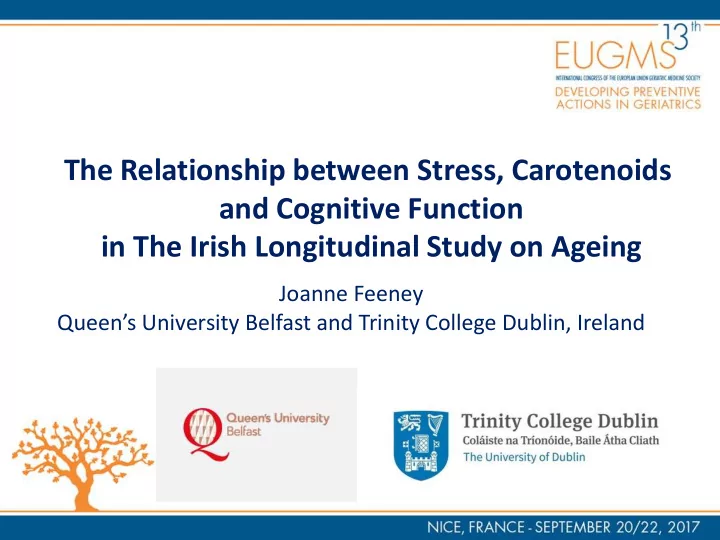

The Relationship between Stress, Carotenoids and Cognitive Function in The Irish Longitudinal Study on Ageing Joanne Feeney Queen’s University Belfast and Trinity College Dublin, Ireland
CONFLICT OF INTEREST DISCLOSURE I have no potential conflict of interest to report
How does stress influence cognitive ability in older adults? Biological Psychological Stress/protective Cognitive Function Stress mechanisms Socio-demographic factors Social engagement Health behaviours Good nutrition - antioxidants
What are carotenoids? • Nutritional pigments, entirely dietary derived Found in brightly coloured vegetables and fruit, egg yolk Form macular pigment in Carotenes Xanthophylls the eye Beta-carotene, Lutein, Zeaxanthin higher concentrations alpha-carotene cryptoxanthin relative to other lycopene carotenoids in the brain Stabilize reactive oxygen species (ROS)
Aims • To investigate the cross-sectional and longitudinal association between psychological stress and cognitive function • To explore whether lutein (L) and zeaxanthin (Z) can moderate the effect of stress on cognition
Methods
The Irish Longitudinal Study on Ageing Observational cohort study of adults 50+ in Ireland, community dwelling at outset Three-stage approach to sampling 3,155 population sampling units (clusters) 640 clusters selected based on geographical spread and socio- economic status 40 addresses randomly selected from each cluster Interviewers visited 25,600 houses n=8,504 community-dwelling adults Household response rate: 62%
Data collection Computer-Assisted Personal Interview (CAPI) Self-Completion Questionnaire (SCQ) Health assessment
Timeline Health Health Health SCQ SCQ SCQ SCQ SCQ SCQ CAPI CAPI CAPI CAPI CAPI CAPI 2020 06-09 2010 2011 2012 2013 2014 2015 2016 2017 2018 2019 Design Wave 1 Wave 2 Wave 3 Wave 4 Wave 5 Wave 6 & Pilot
Data collection Perceived stress scale (short form) Self-Completion Feelings of stress over the past month Questionnaire 0-16 (SCQ) Blood plasma samples Concentration of lutein and zeaxanthin peripherally, measured by HPLC Health N = 3,577 Cognitive tests assessment Memory (word recall) Global cognition (MoCA) Executive function (Colour Trails Task 2) Attention (Sustained Attention to Response Task)
Results
Negative linear association between stress and word recall ** *** **p<.01, ***p<.001; Mixed effects regression model adjusted for age, sex, education, smoking, alcohol use, exercise, plasma vitamin D and vitamin B-12, chronic health conditions
The relationship between stress and memory performance differs according to level of Z * *p<.05; Mixed effects regression model adjusted for age, sex, education, smoking, alcohol use, exercise, plasma witamin D and vitamin B-12, chronic health conditions
Similar pattern is evident for L * *p<.05; Mixed effects regression model adjusted for age, sex, education, smoking, alcohol use, exercise, plasma vitamin D and vitamin B-12, chronic health conditions
Conclusions and future steps • Circulating blood carotenoids lutein and zeaxanthin moderate the association between perceived stress and memory performance in this sample • Cross-sectional association only • What does this mean, if anything? • Location and role of these nutrients in the brain
Acknowledgments Aisling O’Halloran Rachel Moran Daniel Carey John Nolan Stephen Beatty Professor Rose Anne Kenny Professor Ian Young TILDA participants
Funders
Recommend
More recommend